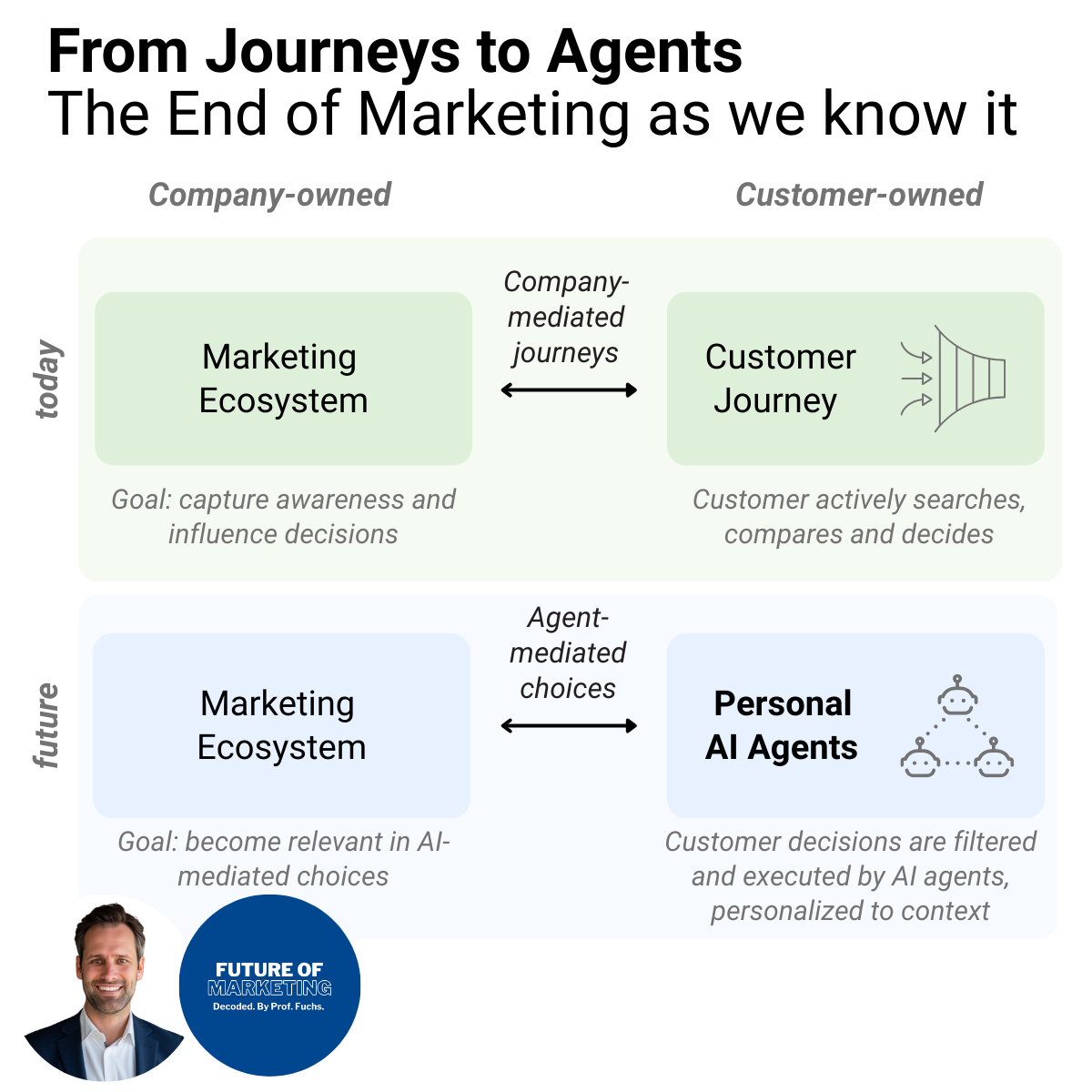The End of Marketing as We Know It
How Marketing shifts from Journeys to Agents
When we talk about the future of marketing, most people think about technologies: artificial intelligence, automation platforms, data lakes. And indeed, these are powerful forces. But the real revolution is not happening inside company systems. It is happening on the customer side.
The Saturation Point of Today’s Funnel Logic
Marketing today still runs on a logic that was invented in the 20th century: the funnel and the customer journey. Companies design a sequence of touchpoints and then push campaigns into the market to capture awareness and influence decisions.
Customers still actively search, evaluate, and compare. They read reviews, click on ads, browse through comparison sites. In theory, the funnel gives companies a way to map and influence this behavior.
But in practice, this model is reaching a saturation point:
Channels are overcrowded. Customers receive thousands of marketing messages every day.
Attention is fragmented. TikTok, YouTube, Instagram, and dozens of other feeds compete for minutes and seconds.
Search costs remain high. Even with reviews and filters, finding the “right” product or service is exhausting.
The result: the traditional funnel is creaking under the weight of information overload.
Why Customers Will Stop Searching
If we project 5 to 10 years into the future, it is unlikely that customers will keep searching, comparing, and deciding manually. Why? Because it is simply inefficient.
Instead, they will rely on personal AI agents to take over this work. Imagine:
A travel agent that plans your holiday, balancing budget, preferences, and hidden gems.
A shopping agent that finds the best washing machine based on quality, energy efficiency, and delivery time.
A financial agent that manages insurance and investments, optimizing across dozens of providers.
These agents will not only search. They will filter, prioritize, and decide. They will compare millions of options in seconds and come back with a recommendation that feels tailored to you.
In other words: the customer journey itself will be outsourced to machines.
Company Systems: From Awareness to Agent Relevance
This shift has radical consequences for companies.
Today: company-owned marketing ecosystems (CRM, CDP, automation, content platforms) are built to capture awareness and influence customers. The goal is visibility.
Tomorrow: these systems must prove relevance to AI agents, not just to human buyers. The goal is inclusion in the agent’s recommendation set.
In the funnel age, success meant being seen by the customer. In the agent age, success will mean being selected by the customer’s machine.
That is a very different game.
The New Gatekeepers
In the funnel, brands defined the journey: what customers saw, in which order, and with what narrative.
In the agent world, the gatekeeper is no longer the brand but the AI agent. The agent becomes the filter, deciding:
which products make it onto the shortlist,
which offers are hidden,
which brands are excluded altogether.
This shift cannot be overstated. In a world of agents, visibility is not bought – it is earned.
Examples Already Emerging
This may sound futuristic, but the logic is already here:
Spotify: You don’t search for every new song – the algorithm delivers playlists.
Netflix: Most users don’t browse endlessly – they accept the recommendation carousel.
Amazon: Product rankings and “customers also bought” already steer choices more than ads.
Now imagine these mechanisms applied to every purchase decision, across industries. That is what personal AI agents will do.
The Cultural Rupture
This is not just a technical adjustment. It is a cultural rupture in marketing.
For decades, marketing was trained for stability: annual campaigns, fixed role profiles, predictable channels. The funnel logic mirrored this stability.
But in the agent paradigm, permanence is gone. Companies must reinvent themselves continuously, adapting to algorithmic selection criteria they do not fully control.
For customers, this is liberating: no more endless comparison tables, no more spam overload. For companies, it is unsettling: the buyer is no longer the direct addressee of marketing efforts. The machine stands in between.
What Companies Must Do
So what does this mean in practice?
Data Quality Becomes Survival
AI agents will not accept vague claims. They will parse structured, verified, and contextualized data. If your product data is inconsistent or misleading, you will simply be filtered out.Trust as Competitive Currency
Agents will privilege reliable sources. Companies that cut ethical corners or manipulate information risk exclusion not only by regulators, but by algorithms themselves.Relevance Over Reach
Mass awareness loses its power. Success is measured by whether you are included in the agent’s “top 3” – not by how many impressions you bought.Design for Machine Interfaces
Instead of designing only for human attention, companies must design for machine readability: APIs, structured metadata, transparent pricing.
The End of Marketing as We Know It
The funnel will not vanish overnight. Campaigns and awareness-building will still exist. But their dominance is ending.
We are entering a world where agents become the decisive gatekeepers.
👉 The decisive question for marketers is no longer: How do we capture customer attention?
👉 It is: How do we convince the customer’s AI agent to recommend us?
That is the end of marketing as we know it – and the beginning of a new discipline.



Hi Andrea,
Very interesting views on how IA is changing drastically consumer behaviour. As a marketer and a researcher, I find this period quite exciting !
I browse Netflix manually, and I find it overwhelming, and give up!